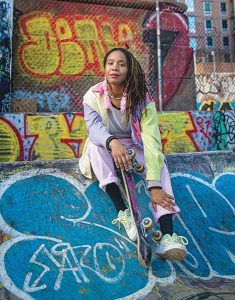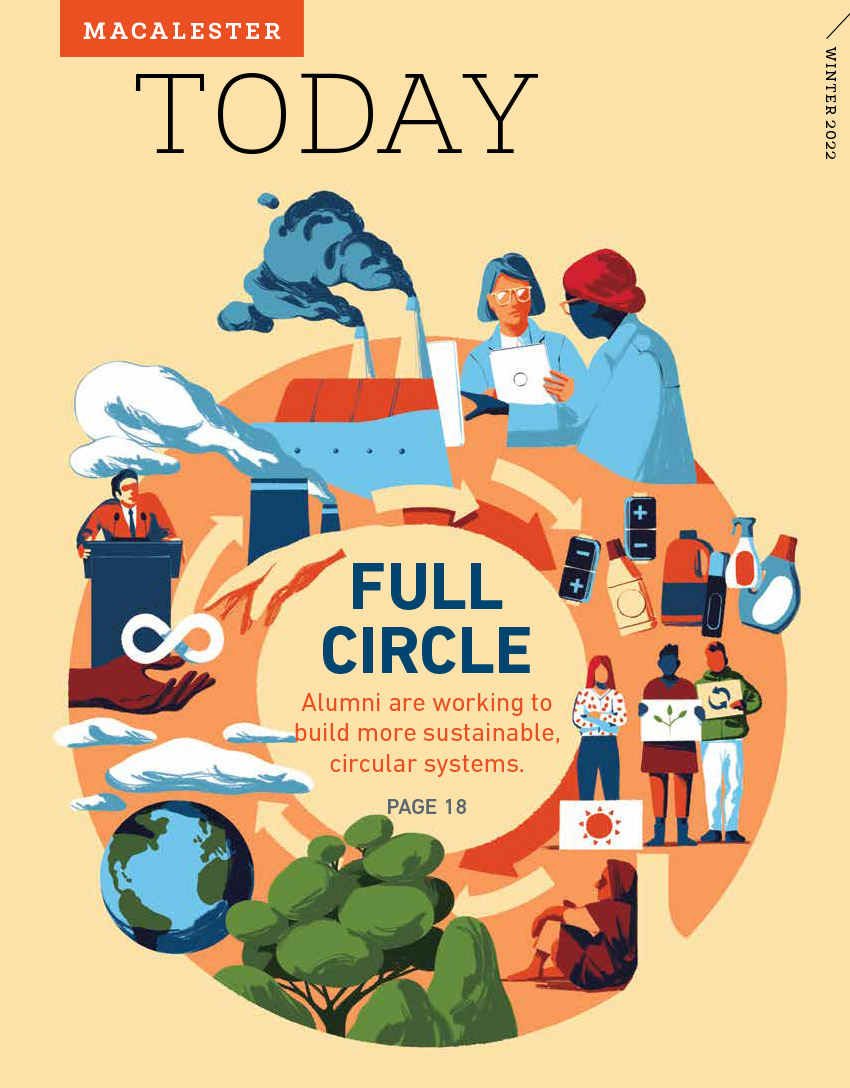
By Tinbete Ermyas ’08 / Photo by Jordana Bermúdez
To call Kava Garcia Vasquez’s love of skateboarding expansive would be limiting. It’s more like a vast web that begins with a kernel of excitement. During our conversation, it came as she started describing her first board: “It was a Sector 9 cruiser with a fishtail, clear grip tape, and big blue wheels,” she reminisces longingly. “I learned how to ollie and pop shove-it on that. It was fire!”
Vasquez’s passion for skateboarding (and the airborne tricks she’s describing) is infectious, but there’s also urgency. And for good reason: She’s been able to use it to traverse many worlds and think about big problems.
She found skateboarding during a major life transition, when she returned to her Bronx, New York, home after three years away at a Connecticut boarding school and wanted to meet new people. “I made friends who would let me borrow their boards until I got my own,” she says. “Once I got that cruiser, skateboarding started to take up more space in my life.”
When she got to Macalester, her passion grew, but not necessarily from being on a board. Vasquez says college taught her how to think differently about connecting with others: “If there’s anything I learned from my time at Macalester, it’s that community is a verb. Both the grand gestures and in-between moments count. Bringing this principle into spaces like skateboarding opens up a lot of doors.”
One of the doors Macalester opened was to a better understanding of her place in the world—as a Black person, a daughter of immigrants from the Dominican Republic, and someone who didn’t always see herself as part of the American social fabric.
At Macalester, she not only grappled with her own identity, but was also better able to understand her upbringing and think about it critically. “A lot of Latin American countries consider themselves a melting pot, and they use that narrative as a way to obscure their prejudices. This cognitive dissonance is baked into politics and culture,” she says. “Before Mac, I didn’t have the language to engage with or challenge the myths and stories we tell about ourselves.”
With a better sense of identity and community, Vasquez explored both after college through a prestigious Thomas J. Watson Fellowship, a one-year grant to pursue independent research abroad. For her project, Vasquez explored “how women are personally, politically, and economically empowered through skateboarding.” Her project took her all over the world, including India, South Africa, Sweden, and Mexico.
While abroad, Vasquez noticed two phenomena. The first: how important skateboarders are to their communities. She met skateboarders who were architects, filmmakers, activists, and artists, “making meaningful contributions to these different cities and spaces.”
 The second thing she noticed was more troubling: Women and girls assumed skateboarding wasn’t for them. “Girls all over the world would say, ‘Oh, I didn’t know girls could do this,’ or, ‘I didn’t know this was possible for us.’” In South Africa, Vasquez says, race added another layer to what she witnessed: a racialized understanding of skateboarding as a white import that Black people just don’t do.
The second thing she noticed was more troubling: Women and girls assumed skateboarding wasn’t for them. “Girls all over the world would say, ‘Oh, I didn’t know girls could do this,’ or, ‘I didn’t know this was possible for us.’” In South Africa, Vasquez says, race added another layer to what she witnessed: a racialized understanding of skateboarding as a white import that Black people just don’t do.
Witnessing both of these things got her thinking about the big ideas—and the big challenges—around skateboarding. There are the personal aspects of learning to skate: a willingness to fall and make mistakes, move on wheels surefootedly, and take up space. And then, of course, there’s the physical aspect of the sport: you need a place to do it. “Skateboarding requires a certain level of infrastructure—it’s all about the concrete and being able to engage with the urban environment,” she says. “And so questions around public space came up a lot.”
Although I’m only a skateboarding observer, much of this resonated. Where I live in Washington, D.C., there aren’t many public skating parks, and so young skateboarders use public monuments to practice their craft or just to hang out. The skaters—almost always young and largely of color—often have run-ins with law enforcement for occupying those spaces. They’re treated like problems to be solved rather than citizens to be served.
In almost every way, Vasquez is working to confront that reality. Last year, she cofounded Bronx Girls Skate. The group’s mission: to cultivate and celebrate women’s skateboarding in the borough. She envisions creating a skate park and community center where women and girls can learn the basics of skateboarding, make art, and have access to a computer lab.
She wants to provide a space for girls to just be—and possibly soar. “I’m even thinking we could sponsor girls—not just with products, but also workshops and professional development,” she says. “If they want to learn how to be a photographer, if they want to be a software engineer, how can we connect them with those resources so they can be fulfilled not just with skateboards, but in a more holistic way?”
By the end of our conversation, I began to see the skateboard as something that could possibly transport us to a better place—a space to fix problems, especially ones facing communities of color in urban areas. Vasquez then chimed in, chuckling: “A friend recently said to me, ‘Boy, that skateboarding is taking you places.’” Her excitement went up a notch, as if her journey’s just getting started: “And I’m like, ‘Yeah, where do we want to go? And what are we going to do to get there?’”
Tinbete Ermyas ’08 is an editor at National Public Radio in Washington, D.C.
January 25 2022
Back to top





